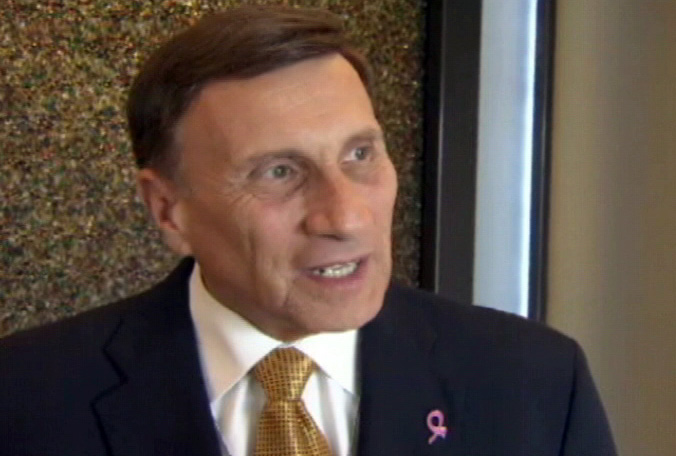House Transportation Committee Chair John Mica (R-FL) said this morning that getting permission from Republican leadership to find more revenues to fund the transportation bill was a “major breakthrough” but still won’t say where the money will come from.

Mica told an audience at a Washington Post-sponsored forum on transportation that passing yet another extension of the surface transportation reauthorization persuaded leadership that there would not be consensus on a long-term bill until the spending levels were raised. “There wont be a gas tax increase,” Mica said, “but our leadership has asked us to look for other sources of revenue, and we’re on that mission now.”
“Speaker Boehner has really opened the door to us to look for any responsible means” to fund the bill, Mica said, adding that a gas tax increase is still off the table. “There’s also the possibility of doing away with it; adopting something else.” He wouldn’t specify what the replacement fee could be.
Nor would he say what he thinks of a Republican proposal to fund the bill with revenues from new oil drilling except to say, “We’re looking at it. We have some scoring issues. And then we have to make sure we have the votes.”
Mica said he was confident that a long-term bill would pass in March. “Don’t let anybody talk about a two-year transportation bill; that’s criminal,” he said. His counterpart in the Senate, Barbara Boxer, has proposed a two-year bill, but could be willing to go along with a longer-term bill if funding levels were raised.
Mica also reiterated his support for state infrastructure banks, saying he prefers them to a national bank. He said the way Washington works is: “the biggest gorillas get the most bananas.” Instead of having big guys compete for big loans from a big national bank, he said, “the best way to prioritize projects is to have them evolve from local level, get local and state participation, and then assist them.”
Transportation Secretary Ray LaHood also addressed the Washington Post gathering. He said he was confident that, despite current gridlock, there was enough pressure on Congress to create jobs that they’ll pass some form of transportation bill this year.
Still, he hinted that Republicans in Congress might be trying to sabotage Obama’s presidency at the expense of the unemployed. He said Congress was polling lower than it ever has among the public “because they haven’t done anything.”
“Maybe that’s deliberate,” LaHood said. “I hope it’s not.”
He said the most recent class in Congress came in, not with a mission to find solutions, but determined to obstruct movement.
Infrastructure bills used to be bipartisan and easy to pass, LaHood said, but “some people don’t want Obama to be successful.” The result? Aside from 9.1 percent official unemployment, “infrastructure is in terrible shape,” he said. “America is one big pothole right now.”
In comments to reporters after his remarks, LaHood said he believed that, despite recent attacks, transportation enhancements (the major way the federal government funds bicycle and pedestrian facilities) would remain.
“These enhancements have always been a part of the transportation program, and I anticipate that they will be in the future,” he said. As for assertions by Sens. Rand Paul and Tom Coburn that bike paths aren’t “real” transportation, he said, “That’s why we have debates in Congress,” but repeated, “I feel pretty confident that these programs will continue.”
LaHood let it slip yesterday that he was planning to leave after Obama’s first term, whether or not the president is re-elected. “My wife has plans for me to do something more monetarily pleasing to her,” he said in an attempt to answer what he might do next.
While some bicycling advocates might hope the president would nominate someone of similarly bike-friendly proclivities, LaHood made it clear that wasn’t why he was nominated. “I wouldn’t have this job if I wasn’t a Republican,” he said. “If I was anything else, I wouldn’t be here today.”
He did say he agreed with the president on transportation, including the importance of getting high-speed rail moving. He said the $10 billion the administration has invested in high-speed rail was “10 billion times more than has ever been invested before” and would make the U.S. the envy of the world again, as Asia and Europe’s rail systems are now.
He countered skepticism about the slow speed and reticence in Congress to fund the program by saying that when he was growing up in Peoria, and the interstate system was being built, “I remember seeing stretches of cement that went nowhere.” But what started as little, disconnected segments eventually came together into one nationwide network.
LaHood also put in a plug for the TIGER program, calling it was a good way to connect projects with the federal government without having to go through governors and that had very little red tape for a federal program. He also highlighted the importance of keeping roads, bridges and transit systems in a state of good repair.





